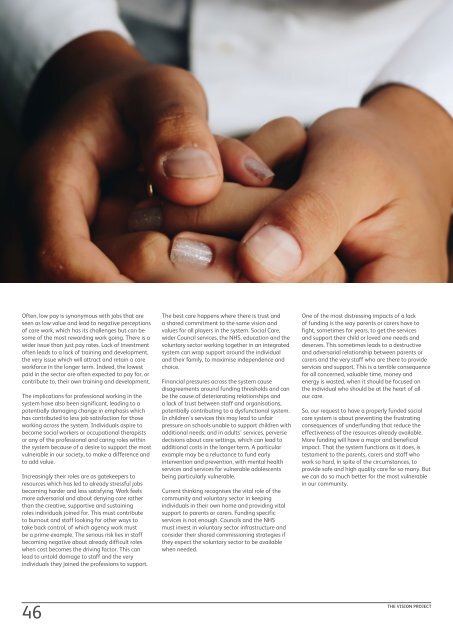The Vision Project
Throughout 2019, Developing Health & Independence (DHI), have been marking their 20th anniversary as a charity by looking to the future. Through articles, events and podcasts, they've asked people to answer the question of how we can achieve their vision of ending social exclusion. This collection of articles includes the contributions of experts from across public life and the political spectrum.
Throughout 2019, Developing Health & Independence (DHI), have been marking their 20th anniversary as a charity by looking to the future. Through articles, events and podcasts, they've asked people to answer the question of how we can achieve their vision of ending social exclusion. This collection of articles includes the contributions of experts from across public life and the political spectrum.
You also want an ePaper? Increase the reach of your titles
YUMPU automatically turns print PDFs into web optimized ePapers that Google loves.
Often, low pay is synonymous with jobs that are<br />
seen as low value and lead to negative perceptions<br />
of care work, which has its challenges but can be<br />
some of the most rewarding work going. <strong>The</strong>re is a<br />
wider issue than just pay rates. Lack of investment<br />
often leads to a lack of training and development,<br />
the very issue which will attract and retain a care<br />
workforce in the longer term. Indeed, the lowest<br />
paid in the sector are often expected to pay for, or<br />
contribute to, their own training and development.<br />
<strong>The</strong> implications for professional working in the<br />
system have also been significant, leading to a<br />
potentially damaging change in emphasis which<br />
has contributed to less job satisfaction for those<br />
working across the system. Individuals aspire to<br />
become social workers or occupational therapists<br />
or any of the professional and caring roles within<br />
the system because of a desire to support the most<br />
vulnerable in our society, to make a difference and<br />
to add value.<br />
Increasingly their roles are as gatekeepers to<br />
resources which has led to already stressful jobs<br />
becoming harder and less satisfying. Work feels<br />
more adversarial and about denying care rather<br />
than the creative, supportive and sustaining<br />
roles individuals joined for. This must contribute<br />
to burnout and staff looking for other ways to<br />
take back control, of which agency work must<br />
be a prime example. <strong>The</strong> serious risk lies in staff<br />
becoming negative about already difficult roles<br />
when cost becomes the driving factor. This can<br />
lead to untold damage to staff and the very<br />
individuals they joined the professions to support.<br />
<strong>The</strong> best care happens where there is trust and<br />
a shared commitment to the same vision and<br />
values for all players in the system. Social Care,<br />
wider Council services, the NHS, education and the<br />
voluntary sector working together in an integrated<br />
system can wrap support around the individual<br />
and their family, to maximise independence and<br />
choice.<br />
Financial pressures across the system cause<br />
disagreements around funding thresholds and can<br />
be the cause of deteriorating relationships and<br />
a lack of trust between staff and organisations,<br />
potentially contributing to a dysfunctional system.<br />
In children’s services this may lead to unfair<br />
pressure on schools unable to support children with<br />
additional needs; and in adults’ services, perverse<br />
decisions about care settings, which can lead to<br />
additional costs in the longer term. A particular<br />
example may be a reluctance to fund early<br />
intervention and prevention, with mental health<br />
services and services for vulnerable adolescents<br />
being particularly vulnerable.<br />
Current thinking recognises the vital role of the<br />
community and voluntary sector in keeping<br />
individuals in their own home and providing vital<br />
support to parents or carers. Funding specific<br />
services is not enough. Councils and the NHS<br />
must invest in voluntary sector infrastructure and<br />
consider their shared commissioning strategies if<br />
they expect the voluntary sector to be available<br />
when needed.<br />
One of the most distressing impacts of a lack<br />
of funding is the way parents or carers have to<br />
fight, sometimes for years, to get the services<br />
and support their child or loved one needs and<br />
deserves. This sometimes leads to a destructive<br />
and adversarial relationship between parents or<br />
carers and the very staff who are there to provide<br />
services and support. This is a terrible consequence<br />
for all concerned, valuable time, money and<br />
energy is wasted, when it should be focused on<br />
the individual who should be at the heart of all<br />
our care.<br />
So, our request to have a properly funded social<br />
care system is about preventing the frustrating<br />
consequences of underfunding that reduce the<br />
effectiveness of the resources already available.<br />
More funding will have a major and beneficial<br />
impact. That the system functions as it does, is<br />
testament to the parents, carers and staff who<br />
work so hard, in spite of the circumstances, to<br />
provide safe and high quality care for so many. But<br />
we can do so much better for the most vulnerable<br />
in our community.<br />
46<br />
THE VISION PROJECT




